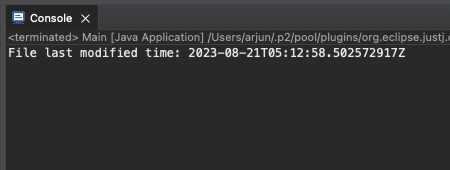In this tutorial, you will learn how to get the file last modified time in Java, using lastModifiedTime() method of java.nio.file.attribute.BasicFileAttributes class.
Java – Get file last modified time
To get the file last modified time of a specific file in Java, read basic attributes of the file using readAttributes() method of the java.nio.file.Files class, and get the file last modified time from the attributes object using lastModifiedTime() method.

If filePath is the given file path, then following is the brief code snippet to get the file last modified time.
Path filePath = Paths.get("/path/to/file");
BasicFileAttributes attributes = Files.readAttributes(filePath, BasicFileAttributes.class);
FileTime lastModifiedTime = attributes.lastModifiedTime();1. Example – Get the file last modified time of the file “data.txt” in Java
Let us write a Java program, to get the file last modified time of a file at the path "/Users/tutorialkart/data.txt", and print it to standard output.
We shall follow these steps.
- Create a Path object filePath from the given file path.
Path filePath = Paths.get("/Users/tutorialkart/data.txt");- Get the basic attributes of the file using readAttributes() method of the java.nio.file.Files class. Call readAttributes() method and pass the filePath and BasicFileAttributes.class as arguments. The method returns a BasicFileAttributes object. Store the returned value in attributes.
BasicFileAttributes attributes = Files.readAttributes(filePath, BasicFileAttributes.class);- Get file last modified time from the attributes object using lastModifiedTime() method of BasicFileAttributes object.
- lastModifiedTime() method returns a FileTime object, which represents the file’s time attribute. Store it in lastModifiedTime.
FileTime lastModifiedTime = attributes.lastModifiedTime();- You may print the lastModifiedTime to output using println() method.
- If there is IOException while handling the file, you may address it using a Java Try Catch statement.
The following is a complete working Java program. You may replace the file path, with the file path of your own.
Java Program
import java.nio.file.Files;
import java.nio.file.Path;
import java.nio.file.Paths;
import java.nio.file.attribute.BasicFileAttributes;
import java.nio.file.attribute.FileTime;
import java.io.IOException;
public class Main {
public static void main(String[] args) {
try {
// Prepare file path
Path filePath = Paths.get("/Users/tutorialkart/data.txt");
// Get file attributes
BasicFileAttributes attributes = Files.readAttributes(filePath, BasicFileAttributes.class);
// Get file last modified time
FileTime lastModifiedTime = attributes.lastModifiedTime();
System.out.println("File last modified time: " + lastModifiedTime);
} catch (IOException e) {
System.out.println("An error occurred: " + e.getMessage());
}
}
}Output
File last modified time: 2023-08-21T05:12:58.502572917ZConclusion
In this Java File Operations tutorial, we learned how to get the file last modified time of a file using lastModifiedTime() method of java.nio.file.attribute.BasicFileAttributes class, with examples.
